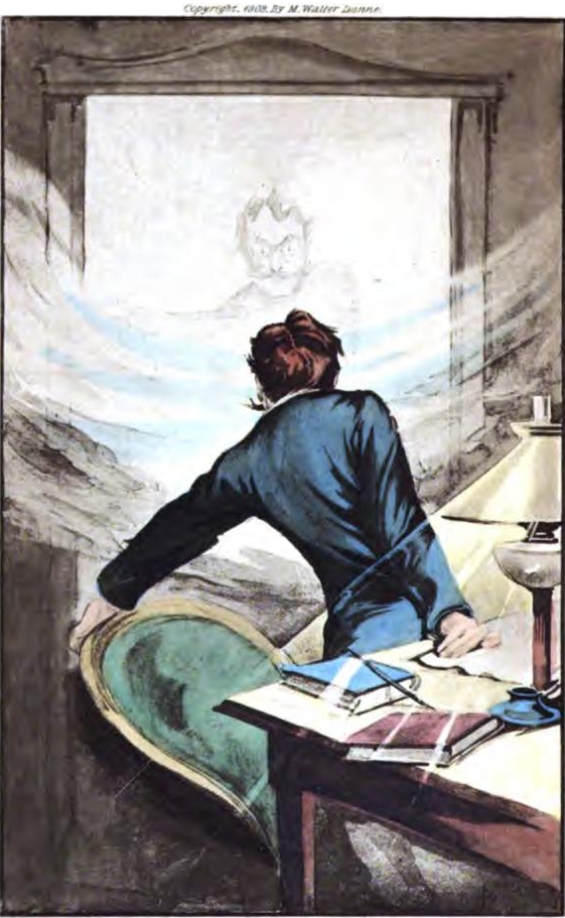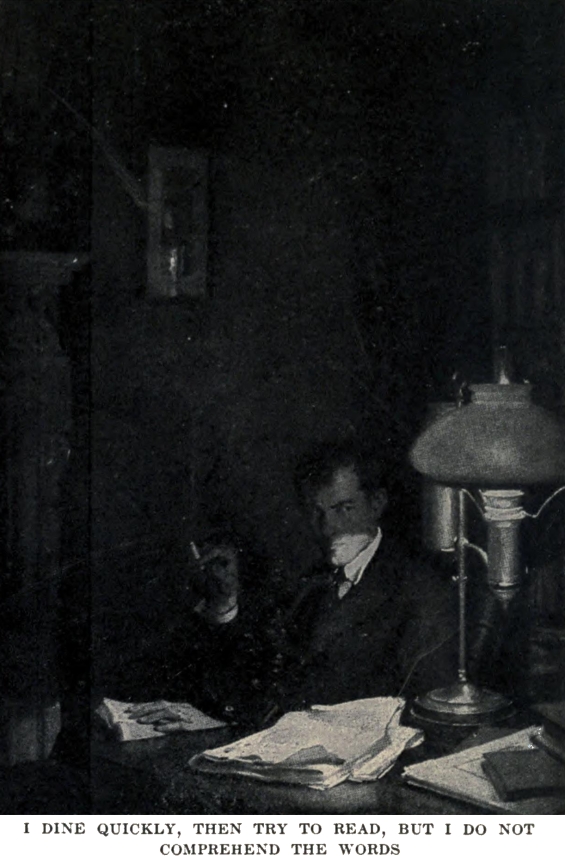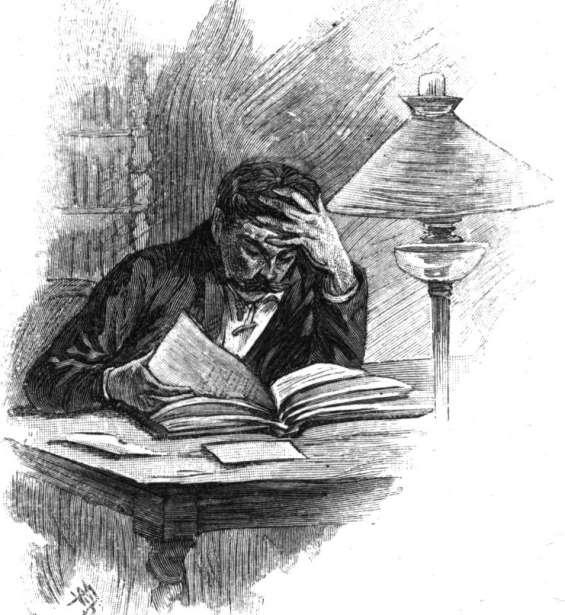
 The SFFaudio Podcast #671 – The Watcher At The Threshold by John Buchan – read by Connor Kaye. This is a complete and unabridged reading of the story (55 minutes) followed by a discussion of it. Participants in the discussion include Jesse, Evan Lampe, and Connor Kaye
The SFFaudio Podcast #671 – The Watcher At The Threshold by John Buchan – read by Connor Kaye. This is a complete and unabridged reading of the story (55 minutes) followed by a discussion of it. Participants in the discussion include Jesse, Evan Lampe, and Connor Kaye
Talked about on today’s show:
Harper’s, December 1900, distraight is a word, distraight is distracted, hearth, fucking deep!, the reference level, operating on a different continent, an earlier period, Supernatural Horror In Literature, August Derleth, The Lurker at the Threshold, the first half, Evan’s bike, prepared for the subtext, folk horror as a genre, the earliest examples of folk horror, a weird tales with hints of folk horror, so good, its hard, nothing happens in this story, coffee and dinner, a restaurant in a small town nearby, an email or something, better than a lot of Lovecraft stories, kinda banal on the service, a friend going around the bend, that moment on that ride together, the evening in the library, Roman history, Roman law, just a few paragraphs, all this happens in the very very end of the story, scenes we can read out, way deeper, hallucinating a little bit, clearer simpler movie, The Grove Of Ashtaroth, no girl, set in Africa (probably Rhodesia), Roman/Scottish folk horror, Semitic folk horror, dynamite and shotgun everything, a descent into a cave, Ash Tree Press, another of Buchan’s weird tales No Man’s Land, take the best scenes in making a comic, a dog cart and a lady at the door, don’t look at that sculpture over there, the narrator is a bit odd, the narrator is a lawyer on vacation, he’s come from Norway, a storycap, in love with his cousin, our narrator is not interested in the story (as much as his cousin), he’s kinda dumb but good at dropping all the hints, the opening, 189_, why is he hiding the year from us, a “true story”, the footnote also makes it a “true story”, lustful after a cousin, I can take her away from here and we can be together (and dump this guy), a familial duty, a former love, she was better off to marry him, he was in love with her, there to service her needs (not his), there’s some sort of underlying thing going on, where he got this from, underdeveloped for a modern audience, not a rip-roaring, The Fall Of The House Of Usher by Edgar Allan Poe, this mid-Atlantic region, Buchan has read Poe, a great setup, what kind of disease does this guy have?, a venereal disease, no successful treatment for the Maupassant disease, The Horla etc., syphilis, a disease of the heart, his left side, always talking about woodcocks, a hillclimb?, billiards, our narrator is dumb, a “sun-worshipper”, the moor is indistinct, he’s not a weird fiction fan, Ladlaw, his disastrous trip to Norway for the hunting, never explained, grumpy the whole time, the case is not going well, eager to get back, too weird for me, I can’t solve it, way to uncomfortable, compared with the fresh highland glen all was chilly and dull and dead, a very bad temper, other John Buchan works, the Clan Roydens, you know the house., who is he talking to?, on the moors, walks and hunts and fishes, pleasant people in the house, a fortnight in Norway, overly dramatic, he just likes shooting, when we finally get to the letter, a PS and another PS, my affectionate cousin, laidlow, Bob is terribly ill and I’m crazy, it is not doctor’s business, he’s dying, she has the same infection, a whole other level to his researches playing a role, shotgunning a goddess, 100% supernatural vs. a supernatural story (a possession story) and venereal disease, Barry Pain, laurels, death figure and life figure, Madam Blavatsky and the Theosophists, a symbolist painting, talking about his left side, kinda dumb, its the devil, in the universe of the story, Justinian making a deal with the devil, Laidlaw, Sybil, Theodora, hip deep in Theosophy, Falun Gong, congregationalist church with theosophy on the side, why this story is so weird, technical things, why is Lovecraft so racist, not everybody was into Theosophy, not ancient Biblical stuff, very specifically about Justinian, law school for a minute, he doesn’t read that much, I’m not going to tell you the story as he said it, set it down exactly as it is said, our narrator than the audience, John Buchan is laying it down so heavy, page 802, three fools alone in the dank upland, gobbling his food and getting scared at his napkin, a mad tea party with a vengeance, the doormouse and the hatter, Alice In Wonderland, Theodora -> a doormouse -> a watcher by the threshold, watching her husband at the threshold of death, very atmospheric and moody, gruesome and spooky, they don’t have any ducks for me to shoot, The Tomb, The Case Of Charles Dexter Ward, details about ancient defensive structures, a Yithian taking him over?, a reincarnation?, a past life exposed by this illness?, what he’s been doing, it used to be full of books about badminton, neat and scholarly (I hated it), horses and shooting, how much time doing Lovecraftian research, the secret history of Justinian, all real books, roll against Library Science, made a deal with the devil, The Thing On The Doorstep, The Shadow Out Of Time, the relationship between Scotland and Justinian, the Roman Inheritance: Christianity and Law, Edward Bulwer Lytton’s Zanoni, confronted by every aspirant, really lame spirituality, it covers everything, Justinian and Theodora are both saints, how they’re really rotten, an evil whore actress, an egoist, how much labour is involved in keeping the estate up, the town is full of poor people, a groom, the employee, they want to go on vacation, a class criticism, the narrator is unaware of class, Robert -> Robin, his sinister side, more bookish, Justinian’s bust, the spirit of Justinian was inside the bust?, the footnote, sleeping trouble, Delacroix Byzantium, the intertextual, The Horla theory, the disease that shall not be named, infected with Justinian’s disease, right up to but not including Scotland, The Rats In The Walls, 18th century England and Rome, John Buchan was an imperialist, WWI, The Thirty Nine Steps, on the path of being responsible for the extinction of a goddess, friends at school, some sort of fascinating connection, “going to seed”, they come into their flower and then go to seed, seedy = disreputable, why Poe and Lovecraft are so different, there are bigger issues than girls, the role of Justinian, he’s a Lovecraftian character, the most basic interpretation, the same spirit or demon, he recognized his own symptoms, Secret History by Procopius, this is an echo of that, textual verification, an amorphous shadow, the divide between the spiritual world and the modern reality, something’s attached to him through that divide, sundown syndrome, you lawyers, sounds like Lovecraft talking, this Mannan, the real landscape, the red earth and the red rock and the red streams of the hills, a new gospel, it would kill materialism, the poets who have deified nature, the profundity, the shaggy somber eyed forefather, wise wise, a queer land nowadays, inscrutable, an important part of this story, reading it literally, the Howard Lovecraft debate about civilization, law tames it, the Mad Hatter, the basic laws of the Enlightenment, 1900, fin de siecle, the yellow nineties, at a precipice, a gilded age, hints of Nietzsche, law can save us, getting that empire back, why is the land red red red, what’s missing is all the people, the Picts, what we think they were like, druids vs. the national spirit of Germany, Tacitus, Buchan’s a Scot who’s part of Empire, servants of Empire, this Empire shit is really bad, keeps the books on rich people’s investments, Montrose by John Buchan, the Jacobites are mentioned, a billiards game sort of story, I would show you the back of simple nature, the groom, I must have speed or go mad, til the ghoulish elder world, a solitary lit window, the red desert?, we’re having trouble picking it all up, putting all the work in, not filmable, a comedic narrator character, I’m a simple guy, I just like shooting things, how’s he gonna help?, the house literally cracks apart and collapses into the surrounding tarn, a metaphor for venereal disease, where are the kids in this family?, the house of MORE, the end of the cycle of empire, we’ve reached our peak, its all downhill from there, Buchan is very much like Ladlaw, photos of Buchan as Governor General in Canada, all the native tribes, Indians, Innu, and Inuit, when the royals come to Canada, you’re a part of the tribe now, a plains Indian headdress, the royal estate, the natives have a closer relationship to Britain than Canada does, Lord Beaverbrook, neo-Jacobites, the Stuart heirs, the divine right of kings, the Scottish kings, political conservatism, send him to Australia, in a way that the Welsh aren’t, engineers of Empire are Scottish, Airstrip One etc., either Scottish independence or a Jacobite restoration, more Buchan, The Green Wildebeest, No Man’s Land by John Buchan, way out into the moors of Scotland, Picts, Worms Of The Earth by Robert E. Howard, brutal but also wise, action packed!, less deep?, he got a writing career in addition, The Thirty-Nine Steps is a potboiler, parallel to this house of More, page 805, the actress harlot devotee, shapeless thing at his side, he dumb, the man in the chair before me, grim earnest, nonsense or no, devilish fancy, two inappropriate laughs, you doofus, he’s a real jerk, horribly anxious, giggling to himself, so insensitive, camped out outside the library, its the devil, oh, you’re serious, always dismissing, wry senses no jokes, clever wordplay, we see it as funny because of our distance, mooching, his ecosystem, Clan Roydens, his Lovecraftian universe, being a Scottish Lord, filing off the serial numbers, a very realistic story, for money, endless vacation time, non-productive lords, a slight realization, all built on labour and the deaths of people who lived here, the official histories are followed by the secret histories, a small incident among upper class twits, a hypocrite but he admits it, subversive in the sense that these upper class people are fucked, Will Emmons says science fiction comes in lots of different flavours but fantasy is for elitists, an Irish Lord and an Oxford don, diplomat, soldier, and writer, he’s solid, Ambrose Bierce is so subversive of his own text, all irony all the time, he’s having fun, William Gibson is always talking about what things are made of, an ironic overlay, adventurey overlay, stymied at all opportunities, a weird thing to do to your story, what the hell is this, so different and boring (comparatively), Supernatural Horror In Literature, his weirdest story, the atmosphere is great, The Weird And The Eerie by Mark Fisher, what is weird?, what is eerie?, the moor is eerie, this vast empty thing, the situation with Ladlaw was weird, leave it and never resolve, you should know what these things are, no resolution, publishers probably hate that, available as an audiobook, tackling many different films and TV shows and books, Prester John by John Buchan.
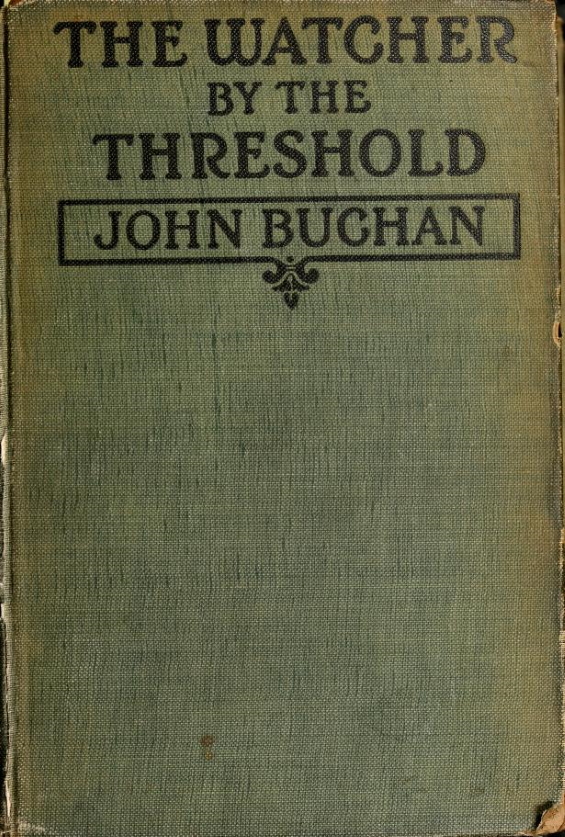
Posted by Jesse WillisBecome a Patron!

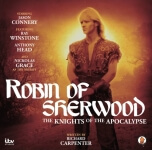
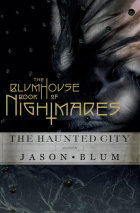 THE BLUMHOUSE BOOK OF NIGHTMARES: The Haunted City
THE BLUMHOUSE BOOK OF NIGHTMARES: The Haunted City 
 The Horla
The Horla